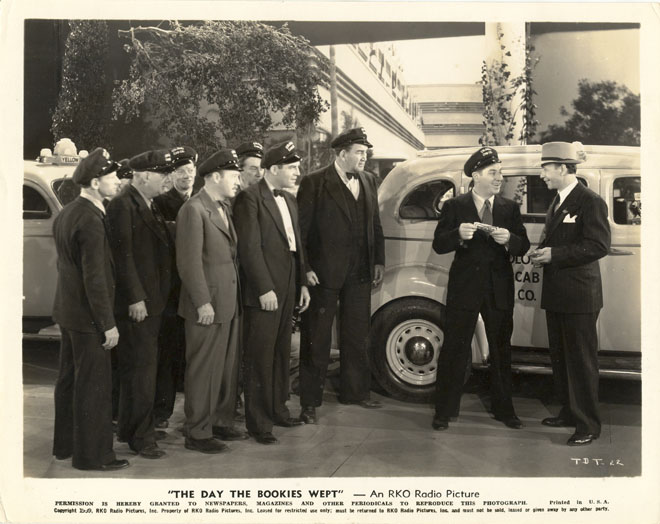|
Enjoy this "stand in" essay (one of my former blog posts) until I can draft a more complete one for this film.
Just in case you’re wondering, the photo below (which used to appear on the masthead of my blog) is a still from The
Day the Bookies Wept, a 1939 RKO picture starring Joe Penner and featuring Richard Lane, Tom Kennedy (pictured in the
center as Joe’s fellow cabbies) and (not pictured) a young Betty Grable. That’s Penner with the money in hand.
Bookies was the sixth of seven films Penner would headline for the studio (he only appeared in ten features), but it
was the one which made Frank Nugent of the venerable New York Times finally crack a smile. As Ernie Ambrose, a taxi driver
who raises pigeons and — as the plot progresses — manages a racehorse for his fellow cabbies, Penner successfully
rose above the creative confinement of his radio catchphrases to carry what Nugent called “one of the funniest shows
of the season” in his September 14 review:
Until today, the best we’ve ever said about Mr. Penner’s comic talents was that they came to the square
root of zero, extended to the fifth decimal point. Now we take it back. In The Day the Bookies Wept, at the Rialto
yesterday, Mr. Penner is superb. Every time he opens his mouth the script-writers put a good line into it. Or nearly every
time: on the off-moments he relies on his adenoids, which are almost as funny.”
Sadly, Penner passed away from an apparent heart attack on January 10, 1941, while appearing in Philadelphia with a touring
company of “Yokel Boy,” the show which helped make Phil Silvers (aka Sgt. Bilko) a star long before he carried
his fast-talking, conniving persona to television and the army.
Penner was a star on radio, stage and screen for the final eight years of his short life (he was voted 1934’s top radio
personality over Crosby, Cantor and Jolson), but he’ll be forever linked to his “wanna buy a duck” line
by the few that still remember him.
He did leave us a parting gift, however. Even though he died before television changed the presentation of popular entertainment,
he helped launch the careers of small screen stalwarts Lucille Ball (who co-starred with him in 1938’s Go Chase Yourself)
and Ozzie and Harriett Nelson (who enjoyed their first network airwave adventures as Penner’s bandleader and vocalist).
Quite a bequest from a humble duck salesman.

Back to the "Joe Penner on Film" page
|